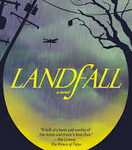 Rose, the 18-year-old protagonist of Ellen Urbani’s novel “Landfall,” is on a quest. She’s survived a car accident that killed her mother and a nameless stranger who happened to be by the side of the road. Rose feels responsible for the accident, and sets out to find out who the victim is, then find her family and tell them. Her mother, Gertrude, was abandoned by her father before Rose was born, and they have moved around a lot. There’s no one to stop her, or help her find another way through her grief.
Rose, the 18-year-old protagonist of Ellen Urbani’s novel “Landfall,” is on a quest. She’s survived a car accident that killed her mother and a nameless stranger who happened to be by the side of the road. Rose feels responsible for the accident, and sets out to find out who the victim is, then find her family and tell them. Her mother, Gertrude, was abandoned by her father before Rose was born, and they have moved around a lot. There’s no one to stop her, or help her find another way through her grief.
Rosy is also 18, and she lives with her mother, Cilla, in the Lower Ninth Ward, a part of New Orleans that’s destined to be flooded by Hurricane Katrina. Rosy’s father died before she was born, and Cilla and Rosy have only each other, and a few neighbors who look out for them. Cilla struggles with manic-depressive illness, and Rosy has learned how to take care of her, manage her medication, and see her through the manias until it’s time to call for an ambulance. Cilla is persuaded they can ride out the storm, and they do – it’s just that once the levees break the water rises fast. Cilla and Rosy retreat, first to the brick house across the street, then to its attic and then, when they can no longer keep the water out, to the roof. It’s harrowing, between the rising water, the elderly neighbor, and another victim who rides toward them on a cooler. Cilla’s meds are lost, and once Cilla and Rosy are rescued Cilla’s behavior as they enter the Superdome leads to her arrest. Rosy fights her way out of New Orleans looking for help.
Each mother is hiding a secret from her daughter, and each daughter sets out on her own and is forced to make difficult – terrible – choices. Rose and Rosy come together in the cataclysm of the accident – it’s not giving too much away to report that the reader learns early on that Rosy is the victim. Rose works backward from the few clues Rosy has left to find Rosy’s family. Urbani alternates Rose’s story with Rosy’s, and it’s to her credit that Urbani keeps the strands distinct. The chapters describing the onset and course of Katrina are vivid and frightening, and Urbani illustrates with Rosy and Cilla’s story the unimaginable stresses of the storm and its aftermath.
Urbani has chosen a complex narrative structure, one that moves both forward and backwards in time. She pulls it off well. The lives of the two young women at its center have many parallels, and Urbani reveals the reasons effectively, creating enough tension to offset the fact that readers may not be entirely surprised by the reveal at the end. Given this complexity, the early chapters are understandably slow-moving, but they are worth wading through, because once the reader gets to the novel’s main current things move swiftly.
Urbani is a writer with a point to make, but her touch is generally light. This is a novel worth reading for its vivid characters as much as its reminders that inequality has consequences we frequently forget to notice. Do you agree? Let us know in the comments.
Have a book you want me to know about? Email me at asbowie@gmail.com. I also blog about metrics at asbowie.blogspot.com.
